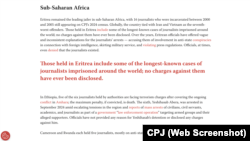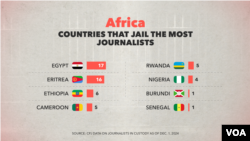At least 67 journalists are imprisoned across Africa, reflecting the continent’s ongoing struggle for a free press, according to a report released Thursday.
The cases in Africa contribute to a global total of 361 journalists jailed as of Dec. 1, according to the Committee to Protect Journalists, or CPJ. It is the second-highest number ever recorded by CPJ.
Muthoki Mumo, the Africa program coordinator at CPJ, said the report highlights a global trend in which authoritarian regimes weaponize laws against journalists, using national security, anti-terror and cybercrime legislation to justify crackdowns.
While these trends are not confined to Africa, the continent has seen alarming cases of journalists facing prosecution under such laws, said Mumo. Countries such as Burundi, Ethiopia and Nigeria are using legislation intended for public safety to criminalize journalism, Mumo said.
In Nigeria, “You have four journalists behind bars being prosecuted under cybercrime legislation in connection to their reporting on corruption,” Mumo told VOA in a video interview.
And in Ethiopia, six journalists are behind bars. “Five of them are facing prosecution under anti-terrorism laws. They could potentially face very harsh penalties if they are convicted,” said Mumo.
Another trend, the media advocacy group says, is the use of vague and broad laws to target journalists.
In Burundi, Sandra Muhoza, a reporter for the online media outlet La Nova Burundi was convicted under national security laws after posting a WhatsApp message. The case, said Mumo, is a clear example of the criminalization of journalism.
Muhoza was convicted recently of trying to “undermine the ‘integrity of the national territory’ — which is a mouthful — but it's essentially, a provision in Burundian laws about national security, and this was turned against this journalist,” Mumo said.
VOA sent messages to Burundi’s government spokesperson, Jerome Niyonzima, along with the Ethiopian communication services minister, Legesse Tulu, and Eritrea’s information minister, Yemane Gebremeskel, requesting comment, but inquiries went unanswered. The Washington embassy of Nigeria has not yet responded to VOA requests for comment.
The continent’s top jailers are familiar names, with Egypt topping the list as the worst jailer of journalists, with 17 held. “In Egypt, we’ve seen anti-state laws being turned against the media,” Mumo said.
Eritrea, known for its long-standing detention of journalists, follows closely behind, with 16 journalists behind bars — some since 2001. Eritrea is home to the longest-detained journalists in the world, many of whom have never been tried in court.
“That's a very dubious honor on the part of Eritrea that the journalists who have been behind jail the longest in the world are actually Eritreans,” Mumo said.
Jodie Ginsberg, the head of CPJ, said it is important to keep advocating for those imprisoned in Eritrea. The country “falls off the radar internationally,” she told VOA, “Because of how little press freedom and media freedom there is to report on what's happening inside.”
“It's very easy sometimes to forget some of those longer cases. They go out of the public eye,” Ginsberg told VOA, adding that it is important to talk about “places where journalists have been in jail for a very, very long time and still need to be fought for.”
Ethiopia, where journalists have been held without trial for extended periods, is another major offender, along with Cameroon, Rwanda and Tunisia. In these countries, journalists are often detained under “anti-state regulation, the use of false news regulations to throw a journalist behind bars and to prosecute them.” Mumo said.
CPJ’s report highlights press freedom issues in Angola, where Carlos Raimundo Alberto, an editor who was arrested on Sept. 29, 2023, remains detained. Raimundo qualified for parole in November 2024 but has yet to comply with a court order to publicly apologize to a government official.
And in Senegal, journalist Rene Capain Bassene has been jailed for life for a crime that witnesses said he could not have committed, the report said.
Mumo said CPJ faces challenges accessing information in some regions about the state of media freedom.
But, she said, “It could also be about intimidation; family members and others who are aware of arrest may not always want to speak out about them.”
Despite obstacles, she said, CPJ strives to keep the names of detained journalists alive. The media advocacy group calls on governments to respect the rights of journalists and make sure that their work is not criminalized.
While the prison census offers a snapshot of the situation on a specific date, Mumo said the report alone cannot fully capture the often-fluid reality journalists face.
The report offers a small window into the larger picture of press freedom, Mumo said, “because there are journalists who go in and out of prison during other times of the year. They’re not reflected in this number.”
VOA's Liam Scott contributed to this report.





